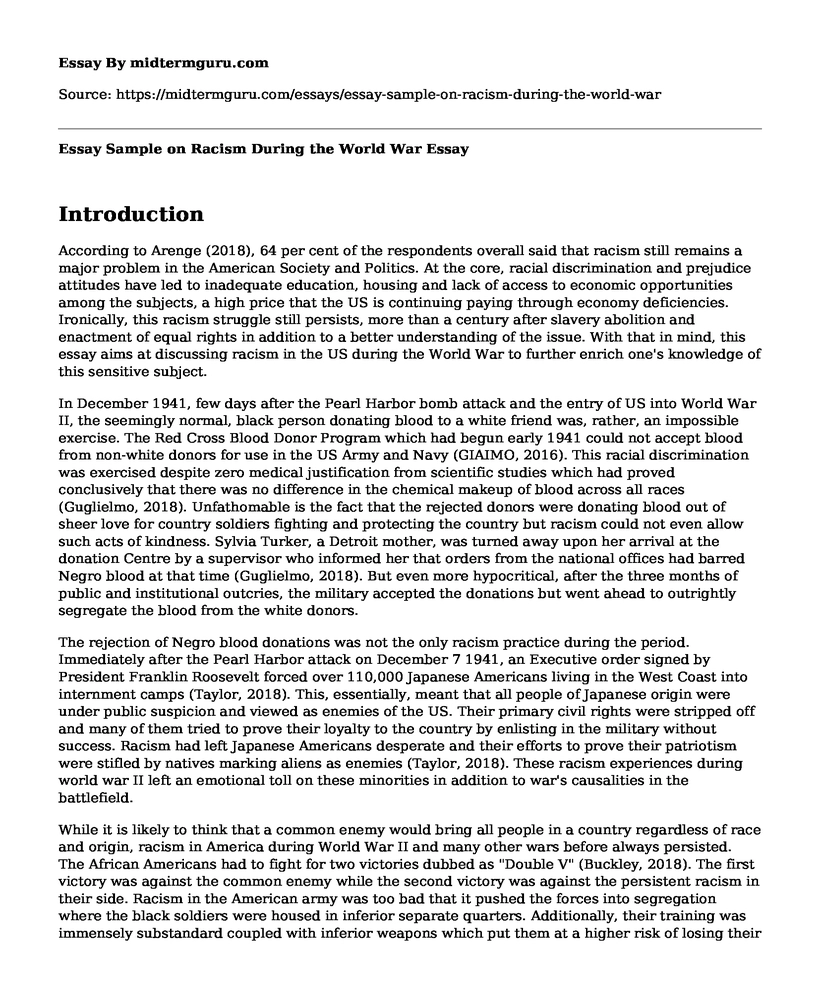Introduction
According to Arenge (2018), 64 per cent of the respondents overall said that racism still remains a major problem in the American Society and Politics. At the core, racial discrimination and prejudice attitudes have led to inadequate education, housing and lack of access to economic opportunities among the subjects, a high price that the US is continuing paying through economy deficiencies. Ironically, this racism struggle still persists, more than a century after slavery abolition and enactment of equal rights in addition to a better understanding of the issue. With that in mind, this essay aims at discussing racism in the US during the World War to further enrich one's knowledge of this sensitive subject.
In December 1941, few days after the Pearl Harbor bomb attack and the entry of US into World War II, the seemingly normal, black person donating blood to a white friend was, rather, an impossible exercise. The Red Cross Blood Donor Program which had begun early 1941 could not accept blood from non-white donors for use in the US Army and Navy (GIAIMO, 2016). This racial discrimination was exercised despite zero medical justification from scientific studies which had proved conclusively that there was no difference in the chemical makeup of blood across all races (Guglielmo, 2018). Unfathomable is the fact that the rejected donors were donating blood out of sheer love for country soldiers fighting and protecting the country but racism could not even allow such acts of kindness. Sylvia Turker, a Detroit mother, was turned away upon her arrival at the donation Centre by a supervisor who informed her that orders from the national offices had barred Negro blood at that time (Guglielmo, 2018). But even more hypocritical, after the three months of public and institutional outcries, the military accepted the donations but went ahead to outrightly segregate the blood from the white donors.
The rejection of Negro blood donations was not the only racism practice during the period. Immediately after the Pearl Harbor attack on December 7 1941, an Executive order signed by President Franklin Roosevelt forced over 110,000 Japanese Americans living in the West Coast into internment camps (Taylor, 2018). This, essentially, meant that all people of Japanese origin were under public suspicion and viewed as enemies of the US. Their primary civil rights were stripped off and many of them tried to prove their loyalty to the country by enlisting in the military without success. Racism had left Japanese Americans desperate and their efforts to prove their patriotism were stifled by natives marking aliens as enemies (Taylor, 2018). These racism experiences during world war II left an emotional toll on these minorities in addition to war's causalities in the battlefield.
While it is likely to think that a common enemy would bring all people in a country regardless of race and origin, racism in America during World War II and many other wars before always persisted. The African Americans had to fight for two victories dubbed as "Double V" (Buckley, 2018). The first victory was against the common enemy while the second victory was against the persistent racism in their side. Racism in the American army was too bad that it pushed the forces into segregation where the black soldiers were housed in inferior separate quarters. Additionally, their training was immensely substandard coupled with inferior weapons which put them at a higher risk of losing their lives in battle. During the entertainment events, a black American soldier would be forced to sit behind the German and Italian prisoners of war (Buckley, 2018). This is a perfect picture of second-class citizenship for the African American soldiers who selflessly fought for their country simply because of their race.
Conclusion
From the above evaluation, while racism is still considered as a big issue in the present American society and politics, the country has made significant strides against the extreme racism experienced in during the world war II period. The level of ignominy treatment during the period was not only unfair for the minority patriots but also it was also for any human being at the core.
References
Arenge, A. (2018). Poll: 64 percent of Americans say racism remains a major problem. [online] NBC News. Available at: https://www.nbcnews.com/politics/politics-news/poll-64-percent-americans-say-racism-remains-major-problem-n877536 [Accessed 21 Oct. 2018].
Buckley, G. (2018). Double V for victory. Retrieved from https://www.economist.com/books-and-arts/2001/06/21/double-v-for-victory
GIAIMO, C. (2016). In the Early 1940s, the Red Cross Banned Black Blood Donors. [online] Atlas Obscura. Available at: https://www.atlasobscura.com/articles/in-the-early-1940s-the-red-cross-banned-black-blood-donors [Accessed 21 Oct. 2018].
Guglielmo, T. (2018). When the Red Cross refused to accept 'Negro blood'. [online] Theweek.com. Available at: http://theweek.com/articles/539242/when-red-cross-refused-accept-negro-blood [Accessed 21 Oct. 2018].
Taylor, A. (2018). World War II: Internment of Japanese Americans. [online] The Atlantic. Available at: https://www.theatlantic.com/photo/2011/08/world-war-ii-internment-of-japanese-americans/100132/ [Accessed 21 Oct. 2018].
Cite this page
Essay Sample on Racism During the World War. (2022, Sep 15). Retrieved from https://midtermguru.com/essays/essay-sample-on-racism-during-the-world-war
If you are the original author of this essay and no longer wish to have it published on the midtermguru.com website, please click below to request its removal:
- The Role of Mohandas Gandhi in Indian Politics - Essay Example
- Secure US Borders: A Necessity for National Safety - Essay Sample
- Two Causes of Racism - Essay Sample
- US Army Suicide: A Growing Mental Health Crisis - Essay Sample
- Employment Discrimination Lawsuits: What Businesses Can Do - Essay Sample
- A Horrific War: The American Civil War (1861-1865) - Research Paper
- Paper Example on Prejudice in Police Profiling and Components of Effective Policing







